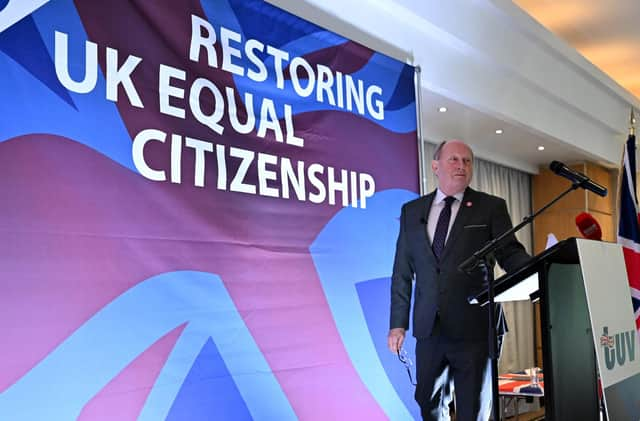Owen Polley: The three-way shape of the unionist contest in the coming general election is taking shape


That might sadden voters who hoped that pro-Union candidates would cooperate, but it reflects serious divisions on the Irish Sea border and differences on the best strategy to remove it or limit its effects.
Some of the DUP’s more prominent personalities flew to Washington DC over the past few days to take part in St Patrick’s Day events. At home, the party’s representatives were sniping at the TUV and other critics, as rallies against Sir Jeffrey’s Donaldson’s ‘surrender deal’ continued.
Advertisement
Hide AdAdvertisement
Hide AdThe DUP itself contains some high-profile sceptics about the Safeguarding the Union agreement, like the East Antrim MP, Sammy Wilson. They do not accept Sir Jeffrey’s contention that it removed the Irish Sea border and stopped an ‘automatic pipeline’ of EU law.
In an interview last week with UTV, Mr Wilson confirmed that he resigned as DUP chief whip because, “I have reservations about some of the things that the party has agreed with the Government and I felt it was inappropriate for me to be in a position where I was asking people to make sure they do toe the party line, while on occasion I may be saying something different from what the party is saying.”
Against that backdrop, the MP may have been expected to attend an anti-protocol meeting in Carrickfergus, in his constituency. Instead, he claimed that would lend credibility to the idea that his party leader was a ‘treacherous sell-out merchant,’ which was an interesting phrase to pick.
He accused the TUV of creating a ‘poisonous atmosphere’ by participating in these events and warned that attacking his party would split unionism.
Advertisement
Hide AdAdvertisement
Hide AdThe DUP has appealed to ‘unionist unity’ before and that is likely to be a theme in the forthcoming election. Its current relationship with republicans, as exemplified by Emma Little-Pengelly’s appearances with Michelle O’Neill, is either constructive or cosy, depending on how cynically you choose to view it. The party, though, will soon depict itself as a bulwark against Sinn Fein and imply that voting for a rival candidate hands a potential victory to nationalism.
The TUV’s leader, Jim Allister, responded to criticism of his party by claiming that it was the DUP that split unionism, by going back to Stormont without resolving issues with the Irish Sea border. Sir Jeffrey was, after all, scathing about the Northern Ireland Protocol too before he signed the recent deal.
On Saturday, the TUV held its annual conference at the Rosspark Hotel near Kells. The party looks set to cast the general election as an effective referendum on the DUP’s recent conduct. Mr Allister will argue that if people want to reject the sea border deal, or express disapproval of the DUP’s cosy relationship with Sinn Fein at Stormont, they should vote TUV. On Saturday, he described the election as a “rollcall… for unionists who have not given up on the Union”.
His party also unveiled an electoral pact with Reform UK, the insurgent party that is a kind of successor to the Brexit Party and Ukip. Its leader, Richard Tice, who spoke at the TUV event, hopes to attract voters on the mainland who feel let down by the Conservatives, because of their lacklustre performance on issues like immigration, the economy and Brexit.
Advertisement
Hide AdAdvertisement
Hide AdThis link-up is certainly interesting. It enhances the TUV’s pan-UK credentials and allows it to claim that it is looking to national politics, while other unionist parties are becoming more parochial. The party's conference backdrop carried the slogan, ‘Restoring UK equal citizenship’. The risk is that voters who want to register a protest at the DUP may feel uncomfortable with Reform’s policies, so it could cut against the idea of the election as a plebiscite on the deal.
As for the Ulster Unionists, last week Lord Empey roundly rejected Sir Jeffrey’s contention that the sea border was gone, pointing out that the government is spending £192 million on inspection posts. His party leader, Doug Beattie, will go into the election arguing that the DUP’s deal did not change the protocol substantially, but that Donaldson belatedly accepted the UUP’s logic that a boycott of Stormont was self-defeating.
As a veteran Ulster Unionist, Lord Empey is scathing about suggestions that criticising the DUP poisons the atmosphere or splits unionism. He remembers when the UUP was the biggest party, defending the Belfast Agreement against critics and undergoing venomous attacks from Democratic Unionists.
Pro-Union voters then, are likely to have at least three main proposals put to them when they go to the polls later this year. The DUP will appeal to them not to split unionism, arguing that they’ve taken difficult decisions to protect our place in the UK. Their leader, at least, will maintain that he successfully removed the sea border.
Advertisement
Hide AdAdvertisement
Hide AdThe UUP will agree that unionist parties need to share power at Stormont in order to show that ‘Northern Ireland works’. But it will not acknowledge that Sir Jeffrey changed the protocol in any fundamental way. As far as Doug Beattie is concerned, other issues take priority.
In contrast, the TUV will ask voters to register their opposition to the sea border and a DUP deal that brought Stormont back with a Sinn Fein first minister. Jim Allister’s party will point to its link with Reform UK, to show that it has allies nationally.
It will be up to the electorate to decide which, if any, of these three messages is the most persuasive.